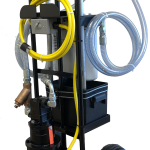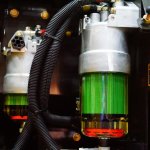How Hydraulic Power Units Work
Hydraulic power units are used in a wide variety of applications and industries. They can be found on fishing boats and construction equipment, in food processing plants, paper mills and military equipment. Anywhere that repeated force is required for lifting, pushing or pulling, hydraulic power units can serve a vital role. Air and Hydraulics Equipment distributes a variety of engineered hydraulic equipment and components, and we’ve spent years crafting our expert knowledge. Now it’s your turn!
If you use a hydraulic power unit, it can be helpful to understand the basics of how it works. Read on for a simple primer.
The Hydraulic Power Unit
A hydraulic power unit is a standalone package that incorporates all the benefits of a hydraulic system. Instead of having to rely on a large system spread out over an area, the system is kept small enough to fit the application is designed for. A skid loader needs to be able to move around to get the job done. The hydraulics it uses need to be incorporated into the design of the skid loader so that it can go back and forth and apply hydraulic power as necessary.
Energy Transfer Through Fluid
A system utilizing hydraulics transfers energy through fluid. The energy in the fluid is used to create linear or rotary motion, or to generate force. The way hydraulic systems operate can range from fairly simple to extremely complex. Unlike a basic hydraulic pump, power units incorporate multiple stages of pressurization to move the fluid and generate power.
The ability of a unit to perform a task is dictated by a variety of factors, including:
- Reservoir volume
- Pressure limits
- Power capacity
Components of a Hydraulic Power Unit
There are a number of features that make up a power unit, each of which can influence the way it performs and what it can be used for. These include:
Motor Pumps
Every power unit will have at least one motor pump, although several motor pumps may be incorporated into a unit. If there is more than one pump, the system will usually only utilize one pump at a time.
Filters
Filters keep the hydraulic fluid clean and extend the life of the power unit. Most filters are situated at the top of the power unit. They will have their own pump, motor and filter as well. Majority of these filters are self-contained. This means that it is commonly possible to change out the filter without shutting down the unit. Up keeping the filtration system within your power unit is a vital piece in operation.
Power Unit Controllers
The power unit controller is required for using a power unit in a system. It is where you will find various displays, switches and other ways to monitor the system.
Accumulators
These are used to collect moisture as the system pumps and are designed to supplement the building of pressure from the motor.
Coolers and Heaters
The fluid in the system needs to be kept within an optimal operating range. Often coolers are used to cool the system, typically near the filter area. In situations where the temperatures get too low, a heater can be installed to maintain the temperature in the system.
Tanks
Power units include a tank for drainage from the pipes.
Typical Operation of a Power Unit
The process begins when the pump draws fluid from the tank and transfers it into the accumulator. The pump will continue to move fluid into the actuator until the desired level of pressure is achieved. Once optimal pressure is reached, the fluid will begin to circulate in the system.
The unit is designed to maintain the pressure needed for operation. If the pressure gets too high, it will be relieved. If it gets too low, it will be increased. There will usually be a thermostat incorporated into the system as well to ensure that temperature is maintained at the right level.
As long as the unit is able to maintain appropriate pressure and temperature, it can be used continuously to generate power.
The Importance of Proper Operation
The use of a power unit requires that every component is operating as necessary. If one of those components begins to malfunction, it can throw everything else out of order and lead to system failure.
Regular maintenance is required for a hydraulic power unit to perform at an optimal level. If maintenance is put off, it can lead to unnecessary wear and tear and even complete failure. With failure comes expensive downtime, which no business wants if it can avoid it.
At AHE, we offer high-quality power units and the maintenance and repair services necessary to keep them running strong. If you are interested in learning more about our power units or our service and repair for hydraulic system components, please contact us. We are here for all your air & hydraulic needs.










